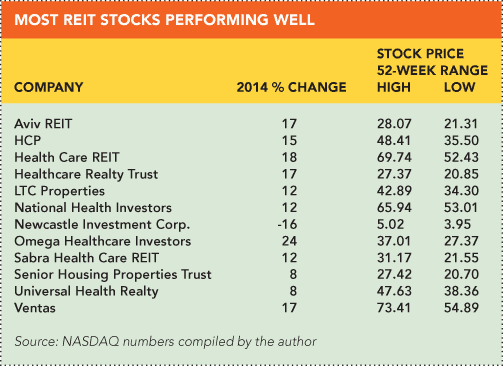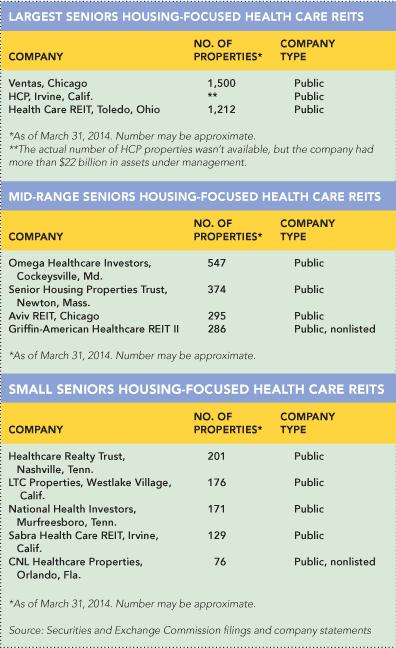REITs have been significantly expanding their portfolios this year, investing considerable money in assisted living, say industry watchers. REITs can offer seniors housing providers a cost-effective monetization option, making capital available to help them take advantage of growth opportunities or build a hedge against risk.
And although in the past REITs were reluctant to be involved in new construction or turnarounds, their greater access to capital has made them more flexible in this regard, especially when it comes to seniors housing companies they’ve partnered with successfully in the past.

The fragmented, $2 trillion health care real estate market is benefiting from competitive capital costs and demographic trends, among other factors. Investor interest will continue to grow, extending the seniors housing recovery into next year, according to Beth Mace, chief economist at the National Investment Center for the Seniors Housing and Care Industry, Annapolis, Md.
There are several reasons for her optimism, including improvements in the volume and prices of home sales, stock market performance, and consumer confidence and income.
And as the number of people over age 80 grows through the next decades, the number of middle-aged family caregivers will shrink, according to a recent AARP study. Today, the ratio of caregivers aged 45 to 64 to people over age 80 is 7:1, the study showed. That ratio will drop to 4:1 in 2030 and to less than 3:1 in 2050, the study found—a decrease due not only to the aging of the baby boomer generation but also to younger women having had fewer children.
Big Health Care REITs Getting Bigger
Ventas, a Chicago-based REIT, is already one of the largest health care REITs in the country, and it will soon be easily the biggest if its plan to acquire competitor American Realty Capital Healthcare Trust (ARCHT) is approved by ARCHT shareholders. The offer was announced in early June.
In fact, Debra Cafaro, Ventas chairman and CEO, said in a video interview at a New York City investor forum that the move will make Ventas “the leading senior housing franchise globally.”
Ventas has now purchased at least three health care REITs, according to The Seniorcare Investor, published by Levin Associates, based in Norwalk, Conn., and the publication’s editors expect Ventas won’t stop there.
The unsolicited $2.6 billion deal has been approved by both boards of directors and is expected to close in the fourth quarter. The announcement caused ARCHT’s stock price to rise by 11.1 percent, while Ventas’ dropped by 2.2 percent.
Ventas also plans to acquire 29 Canadian independent living communities from Holiday Retirement in a $900 million transaction expected to close in the third quarter. The properties will be managed by its portfolio company, Atria Senior Living.
Ventas is recording notable gains in its funds from operations, Cafaro said at the investor forum, arising from productive assets, refinancing at lower interest rates, and the company’s development and redevelopment efforts.
Another Company Expands Into Market
Another of the largest health care REITs, Health Care REIT (HCR) based in Toledo, Ohio, also made a significant move in June, completing a $1 billion public offering. HCR plans to use some of the money to increase its investment in seniors housing and other health care properties.
During the previous month, the REIT sold 14 million shares at $62.35 per share and announced that it has signed preliminary agreements to acquire $414 million of seniors housing and medical office properties during the second quarter. HCR also announced in May the purchase of a 46.8 percent interest in a 10-property Senior Resource Group package. Those properties are in California, Arizona, and Oregon.
In April, Irvine, Calif.-based HCP announced a $1.2 billion entry-fee continuing care retirement community (CCRC) joint venture with Brookdale Senior Living. The 49 percent ownership would give HCP the largest CCRC package of any health care REIT in the country.
Mid-Range REITs Active
Griffin-American Healthcare REIT, a public, nonlisted company that claims 73 acquisitions comprising 286 buildings, has an approach President and Chief Operating Officer Dan Prosky describes as “rifle shot”—as opposed to the larger REITs’ “shotgun”—approach to acquisitions.
Last year, Griffin-American completed $1.5 billion in small acquisitions.

Nontraded REITs like Griffin-American have been very successful with raising capital and, therefore, are aggressive purchasers of property, according to analysts.
For example, Griffin-American has raised almost $3 billion in the past four years, and its investments haven’t stayed solely in the United States. Griffin-American acquired a $472 million seniors housing portfolio from London-based Caring Homes Health Care Group last year. Prosky doesn’t anticipate as much activity this year, but cites the company’s lack of debt and high percentage of mortgage-free properties as conducive to further acquisitions and development.
Industry watchers were anticipating the acquisition of Griffin-American itself. A Wall Street Journal story in May listed four companies vying for Griffin-American and predicted a price tag in the $3.7 billion range.
Some analysts saw ARCHT as the front-runner, with Ventas close behind. But now that Ventas has announced its plan to purchase ARCHT, guessing is the name of the game again.
Nontraded REITs aren’t the only active players in the mid-range, though. Chicago-based Aviv REIT, which is public, has announced a new $600 million credit facility that can be expanded to $800 million. Analysts are predicting the company will use the money for acquisitions.
Small REITs Move Up—At Their Own Pace
The smaller health care REITs are also quite active, although less likely to purchase whole portfolios of properties.
■ Sabra Health Care REIT, Irvine, Calif. Sabra sold 7 million shares at $28.35 per share earlier this year. The company plans to invest between $350 million and $450 million this year, according to Chairman and CEO Rick Matros.
■ CNL Health Care Properties, Orlando, Fla. CNL’s credit facility, increased in May from $120 million to $275 million, will likely result in portfolio growth, especially since the line of credit has the option of being expanded to $325 million.
“The initial line of credit has helped us substantially grow our senior living and health care portfolio over the last several months,” says Stephen Mauldin, CNL’s president and CEO. “The expanded facility will further assist us in taking advantage of compelling investment opportunities as we continue to broaden and diversify our portfolio.”
■ National Health Investors, Murfreesboro, Tenn. NHI acquired an assisted living community for $11.5 million in April, but its long-range goals don’t include growing itself into a large REIT, according to President and CEO Justin Hutchens; rather, NHI takes pride in its attention to prized, quality customers.
■ CareTrust REIT, Mission Viejo, Calif. As of June 2, a new health care REIT has entered the field: CareTrust REIT. CareTrust is a spin-off of The Ensign Group and owns substantially all of Ensign’s properties. CareTrust is now trading on the NASDAQ. Global Select Market. The Ensign Group is now the operating company.